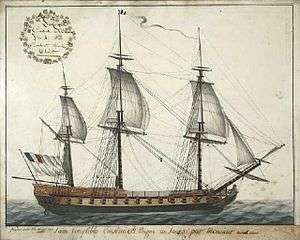Romaine-class frigate
 Portrait of Incorruptible by Olivier Colin. | |
| Class overview | |
|---|---|
| Name: | Romaine |
| Builders: | Le Havre (3); Dieppe (2); Dunkirk (2); Lorient (2) |
| Operators: | |
| Preceded by: | Forte class |
| Succeeded by: | Surveillante class |
| Completed: | 9[1] |
| General characteristics | |
| Type: | frigate |
| Displacement: | 700 tonnes[2] |
| Length: | 45.5 metres[3] |
| Beam: | 11.8 metres[3] |
| Draught: | 5 metres[3] |
| Complement: | 250 men [3] |
| Armament: |
|
| Armour: | Timber |
| Notes: | Ships in class include: Romaine, Immortalité, Impatiente, Incorruptible, Revanche, Libre, Comète, Désirée, Poursuivante.[1] |
The Romaine class was a class of nine frigates of the French Navy, designed in 1794 by Pierre-Alexandre Forfait. They were originally designated as "bomb-frigates" (Fr. frégate-bombarde) and were intended to carry a main armament of twenty 24-pounder guns and a 12-inch mortar mounted on a turntable in front of the mizzen mast. Experience quickly led to the mortars being removed (in most vessels they were never fitted), and the 24-pounders were replaced by 18-pounder guns. The ships also featured a shot furnace, but they proved impractical, dangerous to the ships themselves, and were later discarded.[4] A further eleven ships ordered to this design in 1794 were not built, or were completed to altered designs.
Two vessels of the class became breakwaters in less than 15 years after their construction. The British Royal Navy captured three. One was lost at sea. None had long active duty careers. All-in-all, these ships do not appear to have been successful as first completed, but proved of average performance once re-armed. [clarify]
- Builder: Le Havre
- Begun: March 1794
- Launched: 25 September 1794
- Completed: December 1794
- Fate: Condemned 1804.
- Builder: Lorient
- Begun: May 1794
- Launched: 7 January 1795
- Completed: February 1795
- Fate: Captured by the British Navy on 20 October 1798, becoming HMS Immortalite.
- Builder: Lorient
- Begun: May 1794
- Launched: 12 March 1795
- Completed: May 1795
- Fate: Wrecked off Cape Clear on 29 December 1796.
- Builder: Dieppe
- Begun: March 1794
- Launched: 20 May 1795
- Completed: December 1795
- Fate: Deleted 1815.
- Builder: Dieppe
- Begun: March 1794
- Launched: 31 August 1795
- Completed: December 1795
- Fate: Deleted 1818 or 1819.
- Builder: Le Havre
- Begun: August 1794
- Launched: 11 February 1796
- Completed: January 1798
- Fate: Captured by the British Navy on December 1805, but not added to the British Navy.
- Builder: Le Havre
- Begun: September 1794
- Launched: 11 March 1796
- Completed: January 1798
- Fate: Converted to a breakwater 1808, taken to pieces 1810.
- Builder: Dunkirk
- Begun: February 1794
- Launched: 23 April 1796
- Completed: December 1798
- Fate: Captured by the British Navy on 8 July 1800, becoming HMS Desiree.
- Builder: Dunkirk
- Begun: February or April 1794
- Launched: 24 May 1796
- Completed: April 1798
- Fate: Condemned 1805, made a breakwater 1806 or 1807.
Twenty ships of this type were originally included in the shipbuilding programme placed between October 1794 and April 1794, but several appear not to have been begun. Apart from the nine listed above, a tenth vessel, Furieuse, was begun at Cherbourg in March 1795 to the same design but was completed as a vessel of Forfait's earlier Seine class. An eleventh, Pallas (originally named Première) was begun at Saint Malo in November 1795 to a much modified design; a twelfth, Fatalité was also ordered in October 1793 at St Malo, but was cancelled in 1796, as was a further vessel, Nouvelle, ordered in 1794 at Lorient. Another vessel, Guerrière, was begun at Cherbourg in 1796 to this design but was also completed to a modified design.
References
- Roche, Jean-Michel (2005). Dictionnaire des bâtiments de la flotte de guerre française de Colbert à nos jours, 1671 - 1870. Group Retozel-Maury Millau. ISBN 978-2-9525917-0-6. OCLC 165892922.
- Alain Demerliac, Nomenclature des navires francais de 1792-1799.
- Rif Winfield, British Warships in the Age of Sail, 1793-1817, Seaforth Publishing, 2007, ISBN 978-1-84415-717-4.